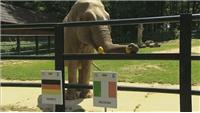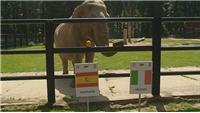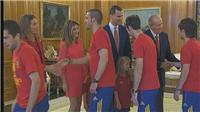
KIEV (Reuters) - West Germany of the cold-war 1970s, with long-haired Gerd Mueller, lank-haired Gunter Netzer and afro-haired Paul Breitner, won almost everything under the command of "Der Kaizer", Franz Beckenbauer.
Although they were not unbeatable, they were the dominant force in world soccer from 1972 until the early 1980s and the legacy they left was carried far beyond that time when Beckenbauer, who by then was coach, led them to their third World Cup triumph in Italy in 1990.
If the current Spain side, who this week equaled West Germany's European record of reaching three successive major finals, want to be counted as their durable equals or betters, they have a considerable way to go.
Spain, who face Germany's conquerors Italy in Sunday's Euro 2012 final here, are attempting to become the first national team to win three successive major titles following their triumphs in Euro 2008 and the World Cup in South Africa two years ago.
West Germany did not manage quite that. After winning the 1972 European title and the 1974 World Cup, they lost the 1976 European final on penalties to Czechoslovakia when Antonin Panenka's famous chipped penalty sealed their fate.
Their record in those years was daunting. As well as winning the 1972 European title and 1974 World Cup they also won the 1980 European title.
Running almost in tandem with the national team's successes were those of Bayern Munich, captained by Beckenbauer and featuring half the national side and champions of Europe in 1974, 1975 and 1976.
Breitner, whose afro hairstyle of the 1970s was as distinctive a motif for both Bayern and the national team as anything else, played for West Germany from 1971 until the 1982 World Cup final when he scored their goal in the 3-1 defeat to Italy.
He recalls coming into the team which was full of his Bayern club mates, and the ethos of the side, fashioned by coach Helmut Schoen, was very much that of a club team.
"Back then we did not have the depth in the squad that Germany have now. Then it was a core of a maximum of 13, 14 or 15 players.
"It was the same as the Bayern years as well where there was a small group of outstanding players. Today there are 23 players and you can change the team around without compromising quality. That is a dream," he told reporters in the build-up to these finals.
NETZER'S MATCH
The first real indication that something special was developing came, of all places, at Wembley Stadium in April 1972, nearly six years after the Germans had lost the World Cup final there to England.
Back then the European Championship finals were staged as a four-team event in one country, and England and Germany were meeting in a quarter-final first leg for the right to reach the finals in Brussels.
The Germans, in their change colors of green and white, destroyed England, or more pointedly Netzer, destroyed them, dominating the midfield in the performance of his life as Germany won 3-1 with goals from Uli Hoeness, Netzer and Mueller.
A few weeks later Netzer played another starring role as they beat the Soviet Union 3-0 to become European champions for the first time with Mueller scoring twice in the final.
As hosts, West Germany were automatically qualified for the 1974 World Cup -- famously losing the only match they ever played against East Germany 1-0 in the group stage -- before beating Johan Cruyff's Netherlands 2-1 in the final with another Mueller double.
With Bayern winning the first of their three successive European Cups the same year, these were heady times for German football, which is why the defeat to the Czechs in 1976 came as such a shock.
But they bounced back four years later in their third successive European Championship final when the powerfully-built Horst Hrubesch took a leaf out of Mueller's book and scored both goals in the final that ended in a 2-1 win over Belgium in Rome.
Naturally, the make-up of the team evolved as the seventies turned into the eighties, but they remained as hard to beat as ever.
With the outstanding Karl-Heinz Rummenigge now their inspirational leader, they fought back from 3-1 down to draw 3-3 with France in the 1982 World Cup semi-final in Seville before beating them in the first World Cup penalty shootout to reach the final.
Their nemesis, Italy, lay in wait and beat them 3-1 and although they failed at Euro 84, they were back in the World Cup final two years later, where Diego Maradona led Argentina to a 3-2 victory in the final - but not before Germany had fought back from 2-0 down.
Beckenbauer led them to one last hurrah, coaching the side to victory against Argentina in the 1990 World Cup final, but has no doubt Germany's great days can return as he told Reuters before this tournament began.
"We had a very special group of players back then, but I also feel we have a very special group now. We achieved so much, and of course could have done better. Today's generation has something to live up to. They are still young and their time can still come."
- Arbeloa: Spain must never change their style
- Wedding bells turn Iniesta's legs to jelly
- Pele: Brazil's 1970 World Cup winners better than Spain
- Pirlo: Only Spain are superior to Italy
- Spain disproved boring tag with empathic final win, insists Alonso
- Fernando Torres revels in Euro 2012 crown
- Italy can reach the final at World Cup 2014
- Johan Cruyff: I enjoyed Italy and I'm a big fan of Del Bosque's Spain
- De Gea & Mata named in Olympics squad
- Shevchenko: Euro 2012 was a success for Ukraine
Hot News
- Funny Balotelli!
- Spanish fans celebrate Euro Cup win
- That's German WAGS!
- The sexy female fans in Euro 2012
- Euro 2012: Spain fans celebrate victory
- Spain vs Italy in clash of the Euro WAGs
- Euro 2012 Final - Spain 4 : 0 Italy, Part 2
- Germany knocked out by Italy
- Natalia Siwiec blasts Sol and the BBC
- Coleen Rooney reveals her bikini body secrets
- Italy's fans celebrated wildly
- Euro 2012 Final - Spain 4 : 0 Italy, Part 1
| Rank | Team | W/D/L | Pts |
|---|
Cities & Stadiums
The Top 3 Teams of Previous Tournaments
| Year | Winners | Runner-up | Third place |
|---|---|---|---|
| 2008 | Spain | Germany | Russia / Turkey |
| 2004 | Greece | Portugal | Netherlands / Czech Republic |
| 2000 | France | Italy | Netherlands / Portugal |
| 1996 | Germany | Czech Republic | France / England |
| 1992 | Denmark | Germany | Netherlands / Sweden |
| 1988 | Netherlands | Soviet Union | Italy / West Germany |
| 1984 | France | Spain | Denmark / Portugal |
| 1980 | West Germany | Belgium | Czechoslovakia |
| 1976 | Czechoslovakia | West Germany | Netherlands |
| 1972 | West Germany | Soviet Union | Belgium |
| 1968 | Italy | Yugoslavia | England |
| 1964 | Spain | Soviet Union | Hungary |
| 1960 | Soviet Union | Yugoslavia | Czechoslovakia |




